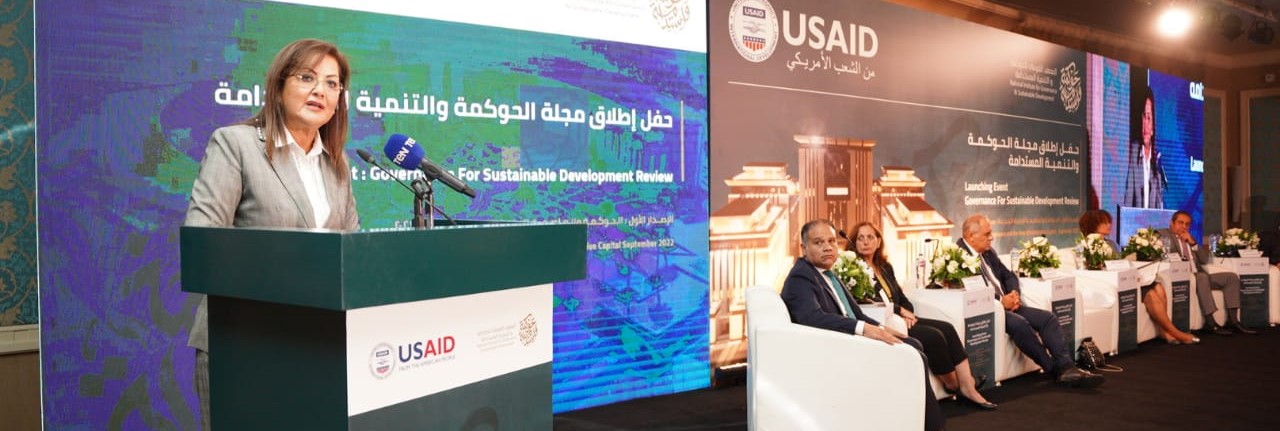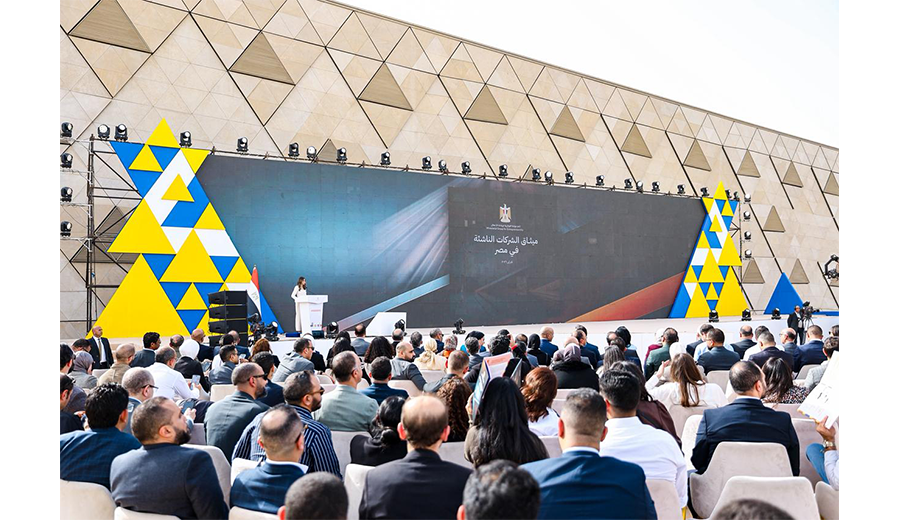NIGSD, USAID launches the first research journal specializing in governance issues

12 September 2022
Egypt’s National Institute for Governance and Sustainable Development (NIGSD)– the training arm of the Ministry of Planning and Economic Development – launched the first research journal specializing in governance issues entitled “Governance and Sustainable Development” as an Egyptian periodical specialized in publishing research related to governance and sustainable development for researchers from Egypt and the world in cooperation with the Economic Governance Project funded by USAID.
The event was attended by H.E. Dr. Hala El-Said, Minister of Planning and Economic Development, Margaret Sancho, Deputy Chief of Mission of the US Agency for International Development (USAID) in Egypt, Dr. Sherifa Sherif, Executive Director of the National Institute for Governance and Sustainable Development (NIGSD), and Eng. Khaled Abbas, Executive Director of The Capital Company, Eng. Khaled Al-Attar, Deputy Minister of Communications and Information Technology, and Medhat Madani, Human Development Expert. The event was moderated by Dr. Khaled Zakaria, Economic Governance Consultant at the Economic Governance Project.
The first issue of the journal deals with the publication of research papers on the new administrative capital and related issues of governance and sustainable development. International researchers from Germany, Japan, and the United States of America participate in the journal. It also contains a research paper issued by the United Nations Development Program.
During her speech, El-Said indicated that this step comes as one of the fruits of the cooperation and the extended development partnership between the ministry represented by the National Institute for Governance and Sustainable Development and the US Agency for International Development, stressing the scientific importance of the magazine, as it is a research platform that encourages Egyptian researchers to publish studies and scientific papers on topics Governance and its scientific applications.
El-Said added that the magazine contributes to spreading the culture of governance, raising citizens’ awareness of governance issues and principles, consolidating transparency and fighting corruption, enhancing accountability, and empowering management, which will reflect positively on the strength and efficiency of institutions, which ultimately leads to improving the level of performance and services that citizens enjoy.
El-Said also mentioned that national and international reports and practical practices confirm the close relationship between governance and sustainable development, noting that in line with that at the national level and following Egypt’s Vision 2030, governance is one of the main enablers to achieving sustainable development goals, where governance came as one of the central tools for development in all fields.
As indicated by the “Human Development Report for Egypt issued last year by the United Nations Development Program under the title “Development is the right of all: Egypt is the path and the path,” noting that Egypt’s classification has risen according to the World Human Development Report, where Egypt jumped (19) position (from 116 in last year’s report to 97 for the year 2021/22).
She further added that Egypt joined the group of countries with high human development instead of the group of countries with medium human development, due to Egypt’s high ranking in sub-indicators related to economic growth, Decent work, good health and education, and decent life initiative.El-Said explained that Egypt has progressed in achieving the sustainable development goals according to the Global Sustainable Development Report, which is one of the most important international reports to monitor countries’ efforts to achieve sustainable development and is published annually by the University of Cambridge in cooperation with some international institutions and under the auspices of the Secretary-General of the United Nations).
“Egypt made progress in many indicators, including data availability and transparency, in addition to clean water and sanitation, climate action, and more,” She explained.
In choosing the topic of the first issue of the magazine (the Administrative Capital); El-Said said that it comes within the framework of the development trend of the Egyptian state to expand in major national projects, including the establishment of fourth-generation cities.
The Minister of Planning stressed the importance of training and capacity building as an essential component of the Egyptian state’s plan to build people, as the state considers investment in the human element as a top priority, especially since it is the best investment pattern, pointing to the Master of Governmental Business Administration ESLSCA University, which graduated from this program about 1,100 Among the employees of the various ministries and affiliated bodies, the percentage of women reached about 55% of the total graduates, as well as grants and training programs in cooperation with the best international institutes and institutions such as the universities of Chicago, Kings College, and Minnesota.
The Minister of Planning and Economic Development pointed to the importance of involving young people, pointing to many initiatives and programs such as “Be an Ambassador”, the Youth for Development initiative, and the Green Minds initiative for students in schools, explaining that in the framework of raising the efficiency of institutions, the state launched the Egypt Award for Government Excellence, stressing that it is not just an award, but it is a journey to excellence that must be present within all institutions.









